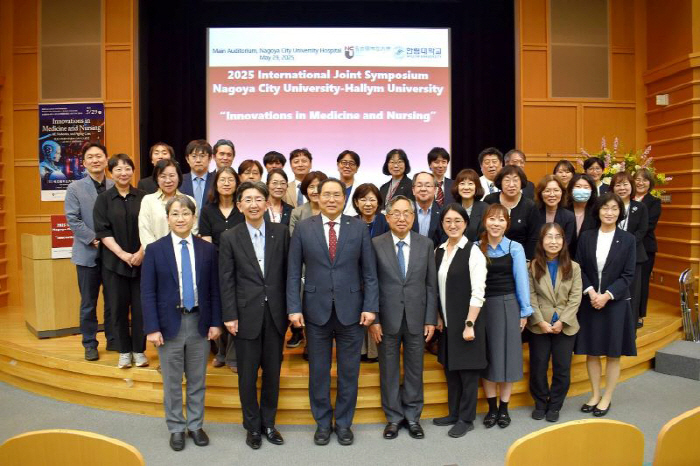Hallym University and Hallym University Medical Center, International Academic Symposium in Japan...Share opinions on how to respond to future medical care
Hallym University (President Choi Yang-hee) and Hallym University Medical Center (Director Kim Yong-sun) held the '2025 Hallym University-Nagoya City University International Academic Symposium" at Nagoya City University in Aichi Prefecture, Japan on the 29th of last month.
The symposium was attended by Yoon Hee-sung, chairman of Ilsong Academy, Choi Yang-hee, president of Hallym University, Kim Yong-sun, president of Hallym University Medical Center, Yoo Kyung-ho, president of Medical School, Lee Jung-min, president of Hallym University Sacred Heart Hospital, Yoon Geum-sun, head of nursing department at Hallym University Hospital, Kenjiro Kori, president of Nagoya City University, Kiyofumi Asahi, and Hiromi Kataoka, president of Medical School.
Under the theme of 「Future Medical and Nursing Paradigm Change—AI, Robots, and Aging Medical Care」, this symposium was held to explore strategies for the medical environment changing with aging. Japan, which entered the super-aged society about 20 years earlier than Korea, is rapidly increasing its demand for medical care such as chronic diseases, rehabilitation, and long-term care, and the shortage of nursing and caring personnel for the care of elderly patients is intensifying. In response, Japan has preemptively responded through rapid aging policies and medical system maintenance. At the same time, Korea has been building a future medical system based on advanced medical technologies such as digital health. In particular, it cooperated with Hallym University Medical Center, which has strengths in future medical technologies such as AI and robots, and devised measures to respond to the super-aged society together.
In the first session, we discussed 'change in the role of nurses in super-aged societies' with a focus on the nursing field. ▲ New role of Korean medical support nurses (PA nurses) ▲ Expanding the role of nurses in a super-aged society (Professor Shin Shin-jung of the College of Nursing at Hanlim University) ▲ Present and future of full-time nurses in Japan (Professor Miss Nakamura of the Department of Nursing at Nagoya City University) ▲ Difficulties of nurses caring for super-aged dementia patients in Japan (Professor Hiromi Hirata of the Department of Nursing at the Department of Nursing at Nagoya City University) were held.
The second session will focus on the topic of 「Disease diagnosis and prediction technology using artificial intelligence」 ▲Automatic recognition and classification of pancreatic cancer cells using the Convolution Neural Network (Professor Park Se-woo of the Department of Gastroenterology at Dongtan Sacred Heart Hospital, Korea National University) ▲ Artificial intelligence-based telemedicine for patients with acute brain disease (Professor Jeon Jin-pyeong of neurosurgery at Chuncheon Sacred Heart Hospital, Korea National University) ▲ Artificial intelligence technology to identify colorectal cancer in CT images (Professor Konomu Uno of the.
The third session is about 'AI-based new drug development and medical service innovation' ▲ Large language model-based central nervous system drug re-creation and new drug discovery platform (Professor Jeon Se-jin of Pharmacology Class at Hanlim University Medical School) ▲ Improvement of CPR education using deep learning model (Professor Lee Jung-ah of emergency medicine at Dongtan Sacred Heart Hospital at Hanlim University) ▲ Service robot in the medical field: A new turning point toward an aging society (Director Lee Mi-yeon of Command Center at Hanlim University Medical Center and Professor of Radiation Oncology at Hanlim University Sacred Heart Hospital) Professor Mizuno Kentaro of the urology department) and others were shared.
On this day, an MOU was signed for nurse cooperation between the two institutions. The agreement introduced a system in which nurses from both sides can be dispatched to the other institutions through short-term training. In the future, it will expand to various cooperation programs such as co-hosting specialized seminars, visiting medical institutions, and cultural exchanges. After the end of the session, we visited nursing facilities in Nagoya, looked directly at elderly-friendly medical sites, and had time to benchmark Japan's medical system. In addition, the MOU and academic exchanges are reported through major Japanese journalists, the Yomiuri Shimbun and the Chunichi Shimbun, and interest in medical cooperation between Korea and Japan has increased.
Kim Yong-sun, medical director of Hallym University Medical Center, said "This symposium was a valuable time to share Japan's advanced aging medical experience and AI and robot-based medical technology of Hallym University Medical Center and promote joint growth of both institutions through changes in future medical and nursing paradigms"We will continue to create a successful international cooperation model through practical exchanges such as the dispatch of nurses and joint research by the two organizations."."
The symposium was attended by Yoon Hee-sung, chairman of Ilsong Academy, Choi Yang-hee, president of Hallym University, Kim Yong-sun, president of Hallym University Medical Center, Yoo Kyung-ho, president of Medical School, Lee Jung-min, president of Hallym University Sacred Heart Hospital, Yoon Geum-sun, head of nursing department at Hallym University Hospital, Kenjiro Kori, president of Nagoya City University, Kiyofumi Asahi, and Hiromi Kataoka, president of Medical School.
Under the theme of 「Future Medical and Nursing Paradigm Change—AI, Robots, and Aging Medical Care」, this symposium was held to explore strategies for the medical environment changing with aging. Japan, which entered the super-aged society about 20 years earlier than Korea, is rapidly increasing its demand for medical care such as chronic diseases, rehabilitation, and long-term care, and the shortage of nursing and caring personnel for the care of elderly patients is intensifying. In response, Japan has preemptively responded through rapid aging policies and medical system maintenance. At the same time, Korea has been building a future medical system based on advanced medical technologies such as digital health. In particular, it cooperated with Hallym University Medical Center, which has strengths in future medical technologies such as AI and robots, and devised measures to respond to the super-aged society together.
In the first session, we discussed 'change in the role of nurses in super-aged societies' with a focus on the nursing field. ▲ New role of Korean medical support nurses (PA nurses) ▲ Expanding the role of nurses in a super-aged society (Professor Shin Shin-jung of the College of Nursing at Hanlim University) ▲ Present and future of full-time nurses in Japan (Professor Miss Nakamura of the Department of Nursing at Nagoya City University) ▲ Difficulties of nurses caring for super-aged dementia patients in Japan (Professor Hiromi Hirata of the Department of Nursing at the Department of Nursing at Nagoya City University) were held.
The second session will focus on the topic of 「Disease diagnosis and prediction technology using artificial intelligence」 ▲Automatic recognition and classification of pancreatic cancer cells using the Convolution Neural Network (Professor Park Se-woo of the Department of Gastroenterology at Dongtan Sacred Heart Hospital, Korea National University) ▲ Artificial intelligence-based telemedicine for patients with acute brain disease (Professor Jeon Jin-pyeong of neurosurgery at Chuncheon Sacred Heart Hospital, Korea National University) ▲ Artificial intelligence technology to identify colorectal cancer in CT images (Professor Konomu Uno of the.
The third session is about 'AI-based new drug development and medical service innovation' ▲ Large language model-based central nervous system drug re-creation and new drug discovery platform (Professor Jeon Se-jin of Pharmacology Class at Hanlim University Medical School) ▲ Improvement of CPR education using deep learning model (Professor Lee Jung-ah of emergency medicine at Dongtan Sacred Heart Hospital at Hanlim University) ▲ Service robot in the medical field: A new turning point toward an aging society (Director Lee Mi-yeon of Command Center at Hanlim University Medical Center and Professor of Radiation Oncology at Hanlim University Sacred Heart Hospital) Professor Mizuno Kentaro of the urology department) and others were shared.
On this day, an MOU was signed for nurse cooperation between the two institutions. The agreement introduced a system in which nurses from both sides can be dispatched to the other institutions through short-term training. In the future, it will expand to various cooperation programs such as co-hosting specialized seminars, visiting medical institutions, and cultural exchanges. After the end of the session, we visited nursing facilities in Nagoya, looked directly at elderly-friendly medical sites, and had time to benchmark Japan's medical system. In addition, the MOU and academic exchanges are reported through major Japanese journalists, the Yomiuri Shimbun and the Chunichi Shimbun, and interest in medical cooperation between Korea and Japan has increased.
Kim Yong-sun, medical director of Hallym University Medical Center, said "This symposium was a valuable time to share Japan's advanced aging medical experience and AI and robot-based medical technology of Hallym University Medical Center and promote joint growth of both institutions through changes in future medical and nursing paradigms"We will continue to create a successful international cooperation model through practical exchanges such as the dispatch of nurses and joint research by the two organizations."."
|
This article was translated by Naver AI translator.




